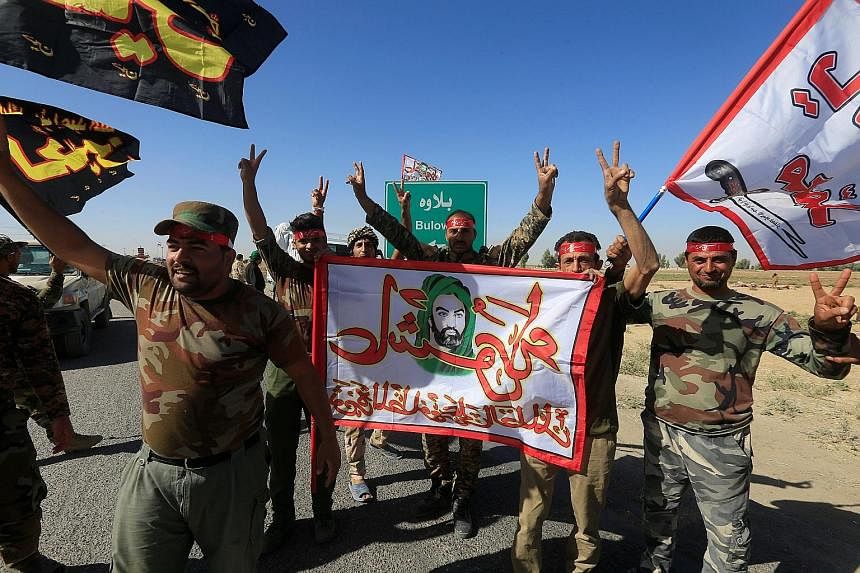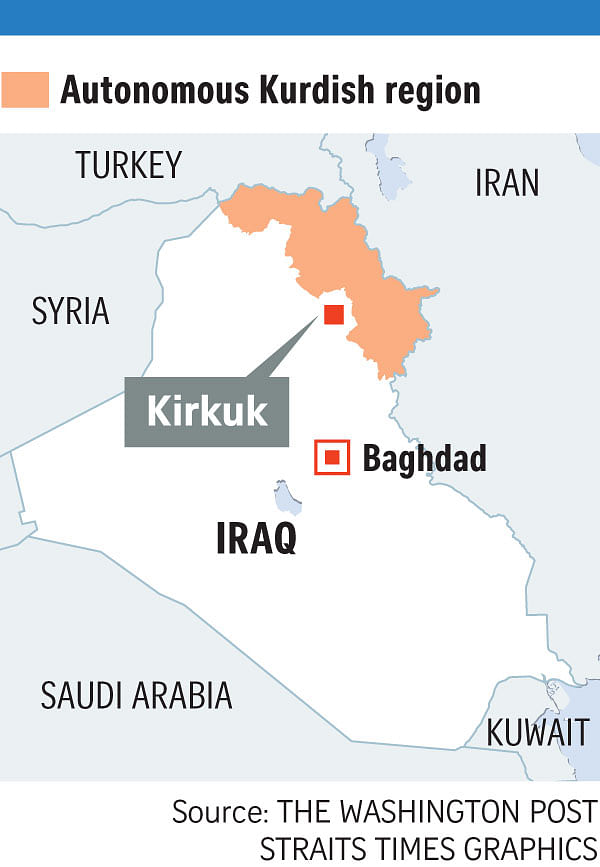WASHINGTON • After years of focusing divided Iraq on a shared fight against the Islamic State in Iraq and Syria (ISIS), the US is now straining to leverage its limited influence to avoid a full-blown conflict between the Iraqi and Kurdish forces it has armed and trained.
Experts say a path towards reconciliation, in some form, exists. But it will be a long, arduous test of nerves that could expose the US-backed war effort in Iraq to risks from insurgents and from militia backed by neighbouring Iran.
President Donald Trump on Monday declared that the United States was not taking sides in the internal conflict between Baghdad and independence-seeking Kurds, as Iraqi government forces captured the Kurdish-held oil city of Kirkuk.
"We don't like the fact that they're clashing. We're not taking sides," Mr Trump told reporters.
"We've had for many years a very good relationship with the Kurds as you know and we've also been on the side of Iraq," he added.
That neutral approach had a cool reception from the Kurdish government representative in Washington, Ms Bayan Sami Abdul Rahman. She said the US had already helped isolate the Kurds by publicly calling for them to postpone the Sept 25 referendum on independence that triggered the dispute with Baghdad.
"With every step, (Washington) emboldened Baghdad, Iran and Turkey... each of them thinking, 'Well, so the Kurds are on their own, we can do whatever we like,'" she said.
The US State Department has urged all sides to "restore calm" and warned that the dispute was distracting from the battle against ISIS, which swept through Iraq in 2014 by exploiting the country's vast ethnic and political divisions.
Meanwhile, Iraqi forces and allied Iranian-backed militias yesterday pressed their campaign to retake oil-rich territory from Kurdish forces, capturing the town of Sinjar without resistance. Iraqi forces also took control of the two largest oil fields in the region, dealing a heavy blow to the finances of the autonomous Kurdish government.
The autonomous Kurdish region is already going through its worst economic crisis after Baghdad severed its air links to the outside world and neighbouring Iran closed its border to trade in oil products.
Baghdad's capture on Monday of Kirkuk, which lies outside the autonomous region, was its most decisive step yet to block the Kurds' independence bid. It also put Washington in the awkward position of recognising the Iraqi government's authority while maintaining ties with its close Kurdish allies. Kurdish Peshmerga forces have said Baghdad would be made to pay a heavy price for triggering "war on the Kurdistan people".
The Pentagon has confirmed that US forces had a presence in the vicinity of Kirkuk but declined to say where. Such a presence could help deter further conflict, a tactic it used in Syria to keep Kurds and Turks from fighting each other.
Mr James Jeffrey, a former US envoy to Iraq, said he believed Iran - which backs the Iraqi militia made up of fellow Shi'ites - was poised to gain influence because of the Iraqi-Kurdish conflict. He said the US needed to make sure Iranian-backed forces do not "surge forward" into the Kirkuk area to challenge Kurdish Peshmerga fighters.
"The US has to make it very clear: We are not going to defend Kirkuk... but if the Iranian militias move forward, we will help the Peshmerga" if necessary, he said.
The threat of Iraqi and Kurdish forces using US-supplied arms against each other has raised alarm in Congress. Senator John McCain, the chairman of the Senate Armed Services Committee, warned Iraq's government of "severe consequences" over any further misuse of US-provided weaponry against Kurdish forces.
"The US provided equipment and training to the government of Iraq to fight (ISIS) and secure itself from external threats - not to attack elements of one of its own regional governments," Mr McCain said.
REUTERS, AGENCE FRANCE PRESSE


